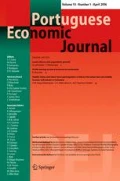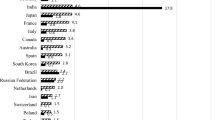Abstract
In this paper we look at the state of Portuguese research in economics, with an emphasis on the 2000–2019 period. For this purpose we use three distinct data sets, namely on publications, citations, and the situation of economics researchers in Portuguese universities. Over the last 20 years, the number of publications in international journals that show affiliations to Portuguese institutions as well as publications by Portuguese authors with foreign affiliations increased considerably. However, after peaking in 2013, the number of publications has since decreased. This may be partly due to the 2010–2014 financial crisis that imposed several restrictions on Portuguese universities, but other factors may also have contributed to the decline.





Similar content being viewed by others
Notes
WoS citations are collected by Clarivate. Nowadays, citation counts can be obtained from several sources (e.g., CrossRef, Google Scholar, Scopus, RePEc) but Hamermesh (2018) shows that the choice of the source is unlikely to affect conclusions drawn from the data.
Data and code available at Harvard Dataverse (https://doi.org/10.7910/DVN/DEKPFN).
This was not always the case. For example, for articles published in the 1980s and earlier, EconLit, the primary source of information for our study, did not provide information about affiliation and would not identify all authors if the number of authors exceeded three.
The link for the website is https://cefup-nipe-rank.eeg.uminho.pt/. This website is supported by the cef.up and NIPE research centers and is maintained by Miguel Portela and Paulo Guimarães.
The list contains close to three hundred Portuguese surnames and is continuously updated. Internet searches and informal queries help identify whether newly identified authors are Portuguese nationals.
See https://ideas.repec.org/top/top.portugal.html#authors, accessed in 09/06/2021.
See Decree-Law No 15/96 published in Diário da República n. 56/1996, Série I-A de 1996-03-06.
The yearly data sets can be downloaded from the following link: https://www.dgeec.mec.pt/np4/BD_Docentes/.
Part of the information for the doctoral degree was obtained from RENATES (https://renates2.dgeec.mec.pt/ppsq.asp), the national register of thesis and dissertations. The rest was gathered from internet searches and from the ERPPI website. For some individuals, information for age had to be imputed based on the earliest available information for education.
The Universidade de Lisboa resulted from the merger of two public universities in 2013: the Universidade Técnica de Lisboa and the former Universidade “Clássica” de Lisboa. For our analysis we merge the output of the two institutions for the entire period.
We acknowledge that citations are an imperfect measure of quality (for a discussion see, Hamermesh 2018) and that they are unable to capture other dimensions of the contribution of a scholar towards society. Still, they remain the most objective way to judge scholar contributions.
“The Log of Gravity at 15” (Santos Silva and Tenreyro (2022)), by the same authors, is a follow-up article published in this issue that reviews the contribution of the original article and provides an update to the literature.
However, we should keep in mind that the set of authors that contribute to the output of Portuguese universities in economics is much wider. It includes researchers with non-economics degrees but in related fields, researchers with a part time-affiliation, graduate students, as well as visiting researchers and researchers affiliated with the university research centers.
Before 2009, universities could hire teaching staff with an undergraduate or a masters degree. These staff had a certain number of years to obtain additional qualifications and could be granted a leave of several years to complete a doctoral degree.
The new ECDU also allows for a “research track” that parallels the regular “tenure track”. Overall we found 5 individuals in our sample that were on the “research track”. The “research track” has three levels that map to the “tenure track”. In the tables presented we reclassified these five individuals in the corresponding levels of the “tenure track”.
In Portugal, universities decide when to open public tenders for associate and full professors. Anyone qualified can apply and a jury of peers decides who gets the promotion. The new ECDU established that the jury must have a majority of elements external to the university.
If an individual is not matched to the list of authors it means that he did not co-author an article in the set of 277 core journals of economics during the 2001 to 2019 period. This does not necessarily mean that he was not scientifically active.
In the Portuguese academic system there are basically three categories: exclusivity, integral, and part-time. A professor in exclusivity works full-time at the institution and receives extra compensation to abdicate from working elsewhere. A professor in integral time is still a full-time professor on tenure-track but may have a secondary income-earning activity. Part-time professors have their main activity in other institutions and are not tenure-track.
References
Abbring JH, Bronnenberg BJ, Gautier PA, van Ours JC (2014) Dutch economists top 40. De Economist 162(2):107–114
Ben-David D (2010) Ranking Israel’s economists. Scientometrics 82(2):351–364
Cardoso A, Guimarães P, Zimmermann K (2010) Comparing the early research performance of PhD graduates in labor economics in Europe and the USA. Scientometrics 84(3):621–637
Cardoso JL (2022) Portuguese economic journal, past and future. Port Econ J 21(3)
Chatzimichael K, Kalaitzidakis P, Tzouvelekas V (2017) Measuring the publishing productivity of economics departments in Europe. Scientometrics 113(2):889–908
Ciaian P, Lancaric D, Pokrivcak J (2018) The productivity of economics research in Slovakia. East Eur Econ 56(2):168–200
Çokgezen M (2019) Research performance of Turkish economists and economics departments: another update and a review of the 2000s. Emerg Mark Financ Trade 55(1):133–149
Corsi M, D’Ippoliti C, Lucidi F (2011) On the evaluation of economic research: the case of Italy. Economia Politica 28(3):369–402
Dusansky R, Vernon CJ (1998) Rankings of U.S. economics departments. J Econ Perspect 12(1):157–170
Fabel O, Hein M, Hofmeister R (2008) Research productivity in business economics: an investigation of Austrian, German and Swiss universities. Ger Econ Rev 9(4):506–531
FCT (1999) Relatório dos painéis de avaliação - economia e gestão, arquivo de Ciência e Tecnologia, FCT, Lisboa
García-Castrillo P, Montañés A, Sanz-Gracia F (2002) A worldwide assessment of scientific production in economics (1992–1997). Appl Econ 34(12):1453–1475
Graves PE, Marchand JR, Thompson R (1982) Economics departmental rankings: research incentives, constraints, and efficiency. Am Econ Rev 72(5):1131–1141
Guimarães P (2002) The state of portuguese research in economics: an analysis based on publications in international journals. Port Econ J 1(1):3–25
Hamermesh DS (2018) Citations in economics: measurement, uses, and impacts. J Econ Lit 56(1):115–156
Karagiannis G, Katranidis S (2015) Accounting for compositional effects in measuring inter-country research productivity differences: The case of economics departments in four european countries. In: Salah AA, Tonta Y, Salah AAA, Sugimoto CR, Al U (eds) Proceedings of the 15th International Conference on Scientometrics and Informetrics, Istanbul, Turkey, June 29 - July 3, 2015, ISSI Society
Katranidis S, Panagiotidis T, Zontanos C (2014) An evaluation of the Greek universities’ economics departments. Bull Econ Res 66(2):173–182
Katranidis S, Panagiotidis T, Zontanos C (2017) Economists, research performance and national inbreeding: north versus south. Economic Notes: Review of Banking, Finance and Monetary Economics 46(1):145–163
Katz DA (1973) Faculty salaries, promotion, and productivity at a large university. Am Econ Rev 63(3):469–477
Mata J (1995) A investigação em economia em Portugal: 1980–1994. Economia 19(2):73–100
Rodrigues MDL (2015) Análise cronológica das políticas públicas: ruturas e continuidades. In: de Lurdes Rodrigues e Manuel Heitor M (ed) 40 Anos de Políticas de Ciência e Ensino Superior em Portugal, Almedina, Coimbra
Santos Silva J, Tenreyro S (2022) The log of gravity at 15. Port Econ J 21(3)
Vasilakos N, Lanot G, Worrall T (2007) Evaluating the performance of UK research in economics, centre for Economic Research, Keele University
Wei G (2019) A bibliometric analysis of the top five economics journals during 2012–2016. J Econ Surv 33(1):25–59
Acknowledgements
We would like to acknowledge several contributions to this paper. First and foremost, that of Miguel Portela, who had a pivotal role in putting together the main data set for this paper, and who also contributed with many suggestions to improve the paper. We also thank Luís Costa, Octávio Figueiredo, Delfim Neto, Diogo Lourenço, Karl-Friedrich Israel and three anonymous referees for comments and suggestions. Any errors or omissions are our own responsibility.
Author information
Authors and Affiliations
Corresponding author
Additional information
Publisher’s Note
Springer Nature remains neutral with regard to jurisdictional claims in published maps and institutional affiliations.
About this article
Cite this article
Guimarães, P., Barbosa, M. The state of Portuguese research in economics: 20 years after. Port Econ J 21, 283–309 (2022). https://doi.org/10.1007/s10258-022-00211-4
Received:
Accepted:
Published:
Issue Date:
DOI: https://doi.org/10.1007/s10258-022-00211-4



